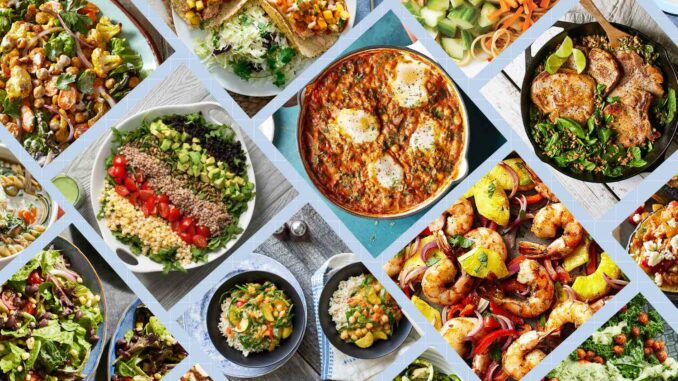
Creating a healthy meal plan for weight loss is a crucial step towards achieving your fitness goals and improving your overall well-being. A well-balanced and nutritious diet not only helps you shed excess pounds but also supports your body with essential nutrients, energy, and vitality. In this comprehensive guide, we will explore the fundamental principles of designing an effective meal plan for weight loss, including setting goals, selecting nutrient-dense foods, meal prepping, and staying consistent.
Setting Goals:
Before embarking on a weight loss journey, it’s essential to establish clear and achievable goals. Consider factors such as your current weight, desired weight loss target, timeframe, and any dietary preferences or restrictions. Setting realistic goals helps keep you motivated and focused on making sustainable lifestyle changes.
Assessing Caloric Needs:
To lose weight effectively, you need to create a calorie deficit, which means consuming fewer calories than you burn. Start by calculating your Basal Metabolic Rate (BMR), which represents the number of calories your body needs to maintain basic physiological functions at rest. Then, factor in your activity level and adjust your calorie intake accordingly to create a moderate calorie deficit for gradual and sustainable weight loss.
Selecting Nutrient-Dense Foods:
A healthy meal plan for weight loss should prioritize nutrient-dense foods that provide essential vitamins, minerals, fiber, and protein while limiting empty calories from added sugars and unhealthy fats. Focus on incorporating a variety of colorful fruits and vegetables, lean proteins such as poultry, fish, tofu, and legumes, whole grains, and healthy fats from sources like avocados, nuts, and olive oil.
Balancing Macronutrients:
Balancing macronutrients—carbohydrates, protein, and fat—is key to optimizing satiety, energy levels, and weight loss progress. Aim to include a source of protein, complex carbohydrates, and healthy fats in each meal to help stabilize blood sugar levels, promote feelings of fullness, and support muscle maintenance and repair.
Planning and Preparing Meals:
Meal planning and preparation are essential components of a successful weight loss journey. Set aside time each week to plan your meals, create a grocery list, and prep ingredients in advance to streamline cooking during busy weekdays. Consider batch cooking healthy staples like grains, roasted vegetables, and lean proteins to assemble quick and nutritious meals throughout the week.
Monitoring Portion Sizes:
While nutritious foods are essential for weight loss, portion control plays a significant role in managing calorie intake. Use measuring cups, food scales, or visual cues to gauge appropriate portion sizes for different food groups and avoid overeating. Be mindful of portion distortion, especially when dining out or indulging in high-calorie treats.
Staying Consistent and Flexible:
Consistency is key to long-term weight loss success. Stay committed to your meal plan and make adjustments as needed based on your progress, preferences, and lifestyle changes. Be flexible and allow yourself the occasional treat or indulgence while staying mindful of portion sizes and overall balance.
Seeking Support and Accountability:
Weight loss can be challenging, but you don’t have to go it alone. Seek support from friends, family members, or a registered dietitian who can provide guidance, motivation, and accountability throughout your journey. Joining a supportive community or engaging in online forums can also help you stay inspired and connected with others who share similar goals.
Celebrating Successes and Practicing Self-Compassion:
As you progress on your weight loss journey, celebrate your successes, no matter how small, and acknowledge the positive changes you’ve made towards a healthier lifestyle. Practice self-compassion and be kind to yourself, especially during setbacks or moments of frustration. Remember that sustainable weight loss is a gradual process that requires patience, perseverance, and a positive mindset.
Conclusion:
Creating a healthy meal plan for weight loss is an empowering step towards improving your health, enhancing your confidence, and achieving your fitness goals. By following the principles outlined in this guide—setting goals, selecting nutrient-dense foods, balancing macronutrients, planning and preparing meals, monitoring portion sizes, staying consistent, seeking support, and practicing self-compassion—you can embark on a journey towards lasting success and well-being. Remember that each person’s weight loss journey is unique, so listen to your body, honor your progress, and enjoy the transformative benefits of nourishing your body with wholesome, delicious foods.